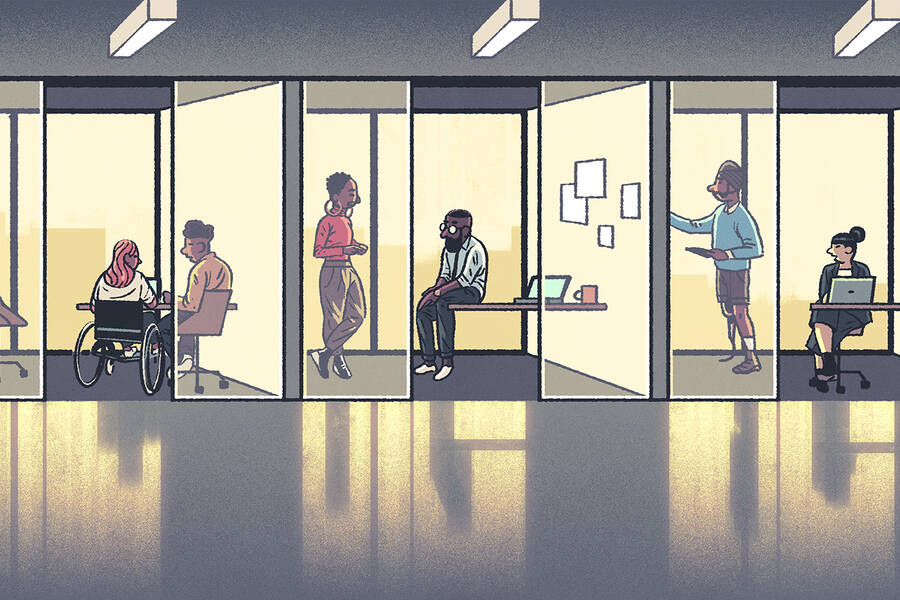Careers Organizations Jun 1, 2020
Younger Workers Lose Out When Their Coworkers Delay Retirement
But at fast-growing companies, the outlook is more promising.

Riley Mann
It’s a common complaint among Gen-Xers and millennials: older workers are retiring later, blocking the career path for younger colleagues who want to move up the hierarchy.
But economists have often dismissed this idea for a couple of reasons. First, if a younger worker is valuable, the firm could create another managerial position for them. Second, if an employee’s current firm isn’t using their talents properly, a rival company could offer a better job. The argument is that “if you’re really good, somebody else should swoop in and poach you away,” says Nicola Bianchi, an assistant professor of strategy at Kellogg.
So do younger workers’ complaints have any merit?
Yes, according to a new study by Bianchi and his colleagues, including Michael Powell, an associate professor of strategy at Kellogg. Their team studied a 2011 policy reform in Italy that tightened pension eligibility requirements. The reform changed the formula used to calculate when a person could claim full benefits, effectively delaying retirement for many workers.
The study found that at firms where older workers had to postpone retirement, younger colleagues’ wages grew more slowly, and they got fewer promotions.
The results suggest that employees’ trajectories are indeed shaped partly by the paths of colleagues, not just by larger market forces. “Workers’ careers are interlinked,” Powell says.
But retirement delays didn’t affect all workers equally. Young employees at fast-growing companies were still able to advance. And wage growth fell only among workers over the age of 35, though Powell expects that some effects will eventually trickle down to the youngest employees as well.
Given these results, companies should be cautious about promising satisfying career trajectories to new hires, Bianchi says. If they do, they need to ensure that the organization is “shaped in a way that younger coworkers are going to be able to have this fulfilling career.”
A Drastic Reform Increases Retirement Age for Many
In many countries, aging baby boomers are putting pressure on retirement systems, and some policymakers are pushing to raise the age for eligibility. With increasing life expectancy, “it’s becoming impossible to sustain the system,” Bianchi says.
In Italy, workers at private companies are eligible to receive a full pension based on either age or a combination of age and the number of years they contributed to social security. To cut spending, the government tweaked the formula for determining eligibility in 2011. This meant that many older employees suddenly faced several more years of work before they could claim full benefits.
Bianchi and Powell collaborated with Giulia Bovini at the Bank of Italy, Jin Li at the University of Hong Kong, and Matteo Paradisi at Harvard University to analyze the fallout. They obtained data from Italy’s National Social Security Institute on wages, job categories, and pension contributions for employees at about 105,000 firms.
Companies need to ensure that they are “shaped in a way that younger coworkers are going to be able to have this fulfilling career.”
— Nicola Bianchi
First, the researchers identified workers who would have been able to retire by the end of 2014 under the old system. Then they calculated how long the new policy delayed each of those employees’ retirement and the average delay at each company from 2009 to 2015. Finally, the team analyzed the effects on younger workers—that is, anyone who was not eligible to retire by 2014 under the old rules.
Retirement Delays and Younger Workers’ Wages
The team found some striking patterns. For each additional year that a firm’s average retirement delay increased, the annual wage growth of younger workers at the company fell by 2.3 percent.
Next, the researchers analyzed promotions. They categorized each job as blue-collar, white-collar, or managerial. Any movement from a blue-collar to white-collar job, or from a blue- or white-collar job to a managerial position, was considered a promotion.
Under these criteria, an additional average retirement delay of one year among white-collar employees was linked to a 20 percent drop in promotions to white-collar jobs. Similarly, an additional delay of about one year was linked to a 50 percent decrease in promotions to managerial positions.
But was this stagnation due to older workers at the top blocking younger colleagues’ upward trajectories, or simply a lack of money? After all, firms might be cash-strapped because they were now employing older employees longer. If that were the case, one would expect to see some decrease in promotions caused by blue-collar workers postponing retirement. While those lower-ranked employees earned less money and thus put less pressure on the company budget, their retirement delays should have at least a small effect.
But that’s not what happened. When blue-collar workers postponed retirement longer, promotions didn’t fall. There was “zero effect,” Powell says.
Reluctance to Quit
Some other employees also dodged the effects of the policy. The team found that the impact of retirement delays on wage growth was far more pronounced at slow-growing firms. People at rapidly expanding companies didn’t experience any changes in income growth, likely because those firms were able to create new managerial positions.
“Just because someone isn’t leaving in a fast-growing firm doesn’t mean that other people can’t also make it to the top,” Powell says.
As for the workers who were blocked at slower-growing companies, one option would be to quit to take another job where they wouldn’t feel professionally stymied. So did they?
“Just because someone isn’t leaving in a fast-growing firm doesn’t mean that other people can’t also make it to the top.”
— Michael Powell
At the time, Italy’s economy was faring poorly, and people generally weren’t switching companies much, Powell says. Still, even relative to that low baseline, the researchers didn’t see a link between retirement delays and higher rates of quitting among younger colleagues.
The result suggests that even when people’s careers were stagnating, they were reluctant to give up the track record they’d built at their current firm to start over at another one. After all, they’ve staked out a position in line for the promotion. “The line has gotten a little bit longer,” Powell says, but they’d rather wait than move farther back in line at another company.
A Trickle-Down Effect?
The researchers also wanted to know how the very youngest employees fared.
They divided employees into three age buckets: 35 and under, 36 to 55 years old, and over 55 years old. During the four years after the policy was enacted, only people in the two older categories experienced decreases in wage growth. That makes sense, since seniority is often a primary criterion for determining who advances. If a 60-year-old stays in a managerial position, then the 45-year-old next in line is stuck as well.
Eventually, those delays could trickle down to the youngest group, Powell says. If the 45-year-old isn’t getting promoted, then the 30-year-old waiting for the 45-year-old’s position is also stuck. But over the next several years, firms might take action to address younger workers’ concerns—for example, by growing faster.
“Over a longer time horizon, they’ll be able to make more and more adjustments,” he says. While these changes may not completely eliminate effects on younger workers, “I would expect them to be dampened.”
Advice for Younger Workers and Companies Seeking to Hire Them
Faced with these findings, what should ambitious younger workers do?
When evaluating prospective employers, they should consider the firm’s growth rate and the age distribution of managers, Powell says. If everyone in high-ranked positions is relatively young, and the firm is growing slowly, there may not be much room for advancement.
Similarly, companies need to think about what they promise their workers. If they recruit new hires by dangling the possibility of satisfying career trajectories, they need to deliver, Bianchi says. For example, perhaps the firm could expand into new markets in order to create more positions or offer buyouts for early retirement to older colleagues.
But if they can’t give promotions, they need to compensate workers in another way, Bianchi says. Typically, a firm can offer “wages today versus career tomorrow,” he says. “If you think that ‘career tomorrow’ is not going to be viable, then you’re going to have to compensate by maybe offering higher wages today if you want to get the same type of talent.”
And policymakers should recognize that raising the retirement age does affect younger workers. Some people argue that such changes won’t stifle employees’ career trajectories because the market will adjust: new companies will be created, or existing companies will expand, to absorb high-quality younger workers.
“While that may be true at the economy level, that’s not going to be true at the firm level,” Powell says. And the fact that many employees seem unwilling to quit their jobs and lose seniority means that “within a firm, those workers who are subjected to that are going to be negatively impacted.”





